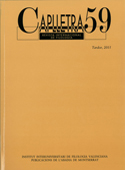Neology in society: 'verba sequuntur'
DOI:
https://doi.org/10.7203/caplletra.59.6907Keywords:
lexical neology, neologicity, society, lexical creativity, lexical interference Abstract
Abstract
Abstract: The starting point of this article has a social nature: neologisms appear to refer to novelties and to cover the expressive needs of speakers. As speakers consider language to be their own and express unformed considerations on new words, this article deals with some of the most frequent questions on this subject: What is a neologism? Are certain neologisms more neological than others? Why do neologisms appear? Are they all necessary to the same extent? What are neologisms in Catalan like? Does Catalan create neologisms or does it only copy them from other languages? The article comes to the conclusion that Catalan, like any other language, has lexical creativity and hosts all kinds of neologisms: stable and ephemeral, new and old, deliberate and unintentional, correct and incorrect, denominative and expressive, well-formed and transgressive.Key words: lexical neology, neologicity, society, lexical creativity, lexical interference.
 Downloads
Downloads
Downloads
Published
How to Cite
-
Abstract706
-
PDF (Català)501
Issue
Section
License
Authors submitting work to Caplletra for publication must be the legitimate holder of the usage rights. Legitimacy for the purposes of publishing the work must also include images, tables, diagrams and any other materials that may complement the text, whether they are the author of such material or not.
Copyright: on publishing their work in the journal, the author grants Caplletra. Revista Internacional de Filologia usage rights (reproduction, distribution and public communication) for both the paper printed version and for the electronic version.
All work published in Caplletra is covered by the Creative Commons license type Attribution-NonCommercial-NoDerivatives 4.0 (CC BY-NC-ND 4.0).
RESPONSABILITY
Caplletra. Revista Internacional de Filologia does not necessarily identify with the points of view expressed in the papers it publishes.
Caplletra. Revista Internacional de Filologia accepts no responsibility whatsoever for any eventual infringement of intellectual property rights on the part of authors.






